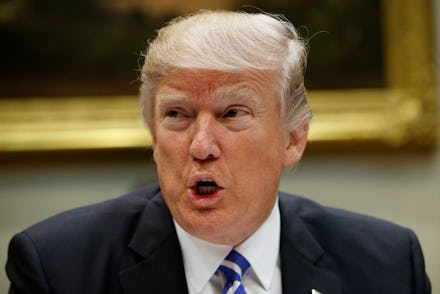Don’t be fooled: Trump’s Muslim ban 2.0 is just as un-American as the first

After multiple delays and over a month of retooling, President Donald Trump signed a revised executive order on Monday that bans immigration from six Muslim-majority countries, excluding Iraq.
The ban, which comes after Trump's initial executive order was blocked in court, makes small changes at the margins. Visas will not be issued to people from Iran, Libya, Somalia, Sudan, Syria and Yemen for the next 90 days. Rather than single out Syrian refugees for exclusion, the new order stipulates that the U.S. will not admit any new refugees for 120 days. Green card holders and those with existing, valid visas are exempt. The ban will take effect on March 16 to avoid the chaos that resulted from heartbreaking airport detentions that galvanized protesters at airports across the country.
President Trump’s travel ban 2.0 is just as un-American as the first.
To the casual observer, some of these changes may sound promising. But make no mistake: You can put lipstick on a pig but Trump’s travel ban 2.0 is just as un-American as the first.
Trump senior adviser Stephen Miller, who is one the executive order's chief architects, even admitted as much in February. "Fundamentally, you're still going to have the same basic policy outcome for the country," he told Fox News. “These are mostly minor technical differences.”
Faiz Shakir, the ACLU's national political director, said the organization will be returning to court to fight the measure.
"The Trump administration must think the American people are fools if they think we don’t all see this for what it is — a Muslim Ban," Shakir said. "It is denying entry to Muslim visa applicants and Muslim refugees. It fulfills Trump’s dreams and ambitions of imposing a religious test on those who enter the United States."
The order is premised on the same misinformation that informed the previous version. Namely, Trump claims the order will protect national security and prevent terrorist attacks in the U.S. by barring immigrants from places where terrorism is common.
But here's how many Americans have been killed since 1975 in terrorist attacks from the countries included in the ban: 0.
And yet the countries most responsible for American casualties related to terrorism are nowhere on the list. Terrorists from Saudi Arabia have been responsible for 2,369 American deaths; the United Arab Emirates, 314; and Egypt, 162.
In its decision rejecting the initial ban, the Ninth Circuit of Appeals noted that “the Government has pointed to no evidence that any alien from any of the countries named in the Order has perpetrated a terrorist attack in the United States.”
Nothing has changed — why certain countries are on or off the list is still anyone’s guess.
By singling out citizens from particular countries and banning all refugees, this ban violates our values as Americans. As I've previously written, 54% of Americans support Trump’s travel ban — a core campaign promise — but interning the Japanese and turning away Jews during World War II was also popular.
We’ll see what America's "so-called" judges determine this time in court.